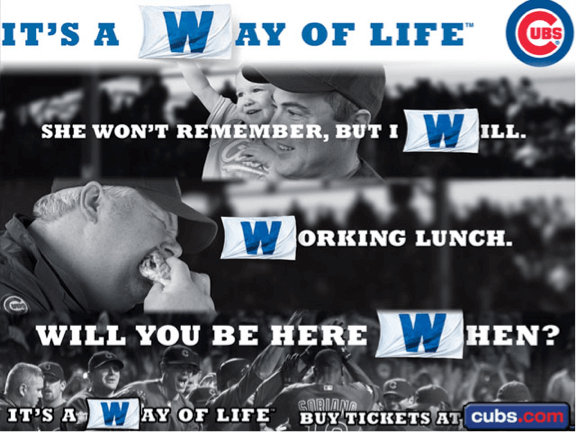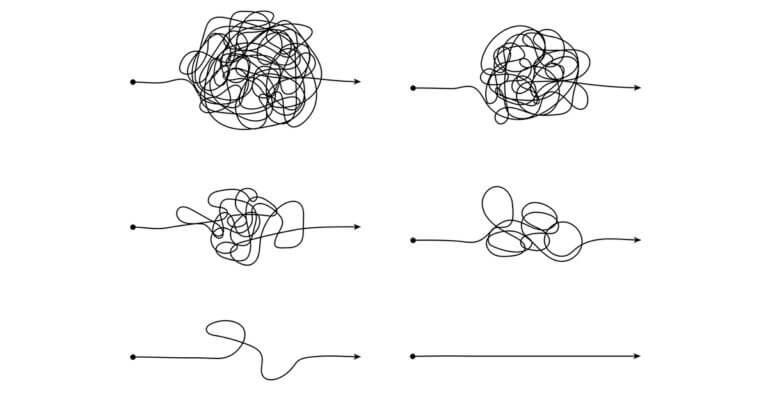October 14, 2015

“The Cubs Way”: Lessons in Leadership, Cultural Change and Performance Improvement
Market Corner Commentary for October 14, 2015-“The Cubs Way”: Lessons in Leadership, Cultural Change and Performance Improvement
 Any team can have a bad century! The Chicago Cubs define ineptitude. They haven’t won the World Series since 1908. They haven’t even played in a World Series since 1945.
Any team can have a bad century! The Chicago Cubs define ineptitude. They haven’t won the World Series since 1908. They haven’t even played in a World Series since 1945.
According to Will, choosing between the Cubs and Cardinals changes lives. Cardinal fans are naturally optimistic, see the glass as “half full” and have faith in the future. By contrast, Cub fans are paranoid, see danger lurking everywhere and distrust everyone.
Perhaps that explains Will’s own sour demeanor. He said this in a 1990 USA Newsinterview, “All I remember about my wedding day in 1967 is that the Cubs lost a double-header.”
In October 2011, the Cubs hired Theo Epstein as President of Baseball Operations to right the ship. Since taking over, Epstein has engineered a complete makeover of Cubs baseball. After last-place finishes his first three years, the 2015 Cubs won 97 games and had baseball’s third-best record.
What a difference a year makes. The Cubs just defeated their arch-rival Cardinals to advance to this year’s National League Championship Series. Perhaps the 1989 movieBack to the Future II is right. 2015 will be the year the Cubs win the World Series.
Like the Cubs in 2011, health company leaders must transform their organizations to prosper in a more competitive marketplace. Winning in post-reform healthcare is a daunting challenge. The Cubs turnaround offers several lessons for managing organizational change.
“The Cubs Way”[1]
 Only 42, Theo Epstein has already produced one miracle turnaround. As baseball’s youngest general manager, he overcame the “curse of the Bambino” in orchestrating Boston Red Sox World Series victories in 2004 and 2007.Epstein inherited a Cubs organization in disarray. The team was terrible. A “me-first” player attitude dominated the dugout. Scouting and player development were broken. The facilities were crumbling – Wrigley Field had nets to catch falling concrete. The small front-office staff worked in trailers and processed group ticket sales with carbon paper. Performance reviews were largely non-existent.
Only 42, Theo Epstein has already produced one miracle turnaround. As baseball’s youngest general manager, he overcame the “curse of the Bambino” in orchestrating Boston Red Sox World Series victories in 2004 and 2007.Epstein inherited a Cubs organization in disarray. The team was terrible. A “me-first” player attitude dominated the dugout. Scouting and player development were broken. The facilities were crumbling – Wrigley Field had nets to catch falling concrete. The small front-office staff worked in trailers and processed group ticket sales with carbon paper. Performance reviews were largely non-existent.
Epstein immediately raised expectations and began preaching “The Cubs Way”. The Cubs set three goals: 1. Be a good neighbor; 2. Preserve historic Wrigley Field and 3. Win the World Series. Cub fans reacted cynically. They’d heard it all before. One graphic parodied Epstein’s new guidelines, suggesting managers can’t be morons and outfielders must catch better than bleacher fans.
During 2012 spring training, Epstein distributed massive staff manuals detailing every facet of “The Cubs Way” doctrine – “from code of conduct to which foot to plant on the bag while making your turn around a base.”[2] For Epstein, “The Cubs Way” is a “living, breathing thing”. Here’s how he described it in early 2012,
“The Cubs Way” really boils down to the people. The players, obviously, but then all the scouts, all the people in the minor leagues, here in the big leagues. It’s more than words on a page. It comes down to how deep we dig to get connected to players, to teach the game the right way, how much we care, how committed we are, how we treat each other in the front office, the coaches, the plyers, how hard we work.”[3]
Action Steps
Clearly, the Cubs needed to improve both their baseball and business operations. Epstein and Kennedy attacked the task with vigor. Here’s what they did:
- Big Goals: top to bottom in both baseball and business operations, the Cubs have a unified, selfless commitment to winning a World Series.
- World-Class Facilities: the Cubs are undertaking a massive $575 million Wrigley Field renovation and building a trendy professional office building. They’ve already completed new training facilities in Mesa, Arizona and the Dominican Republic. Where appropriate, the Cubs use partnership arrangements to fund facility development costs and mitigate operating risks.
- Talent Acquisition: the Cubs hired difference-makers to turbocharge organizational transformation. Sensing the team’s potential, Epstein convinced baseball’s best manager (Joe Maddon) and premier pitcher John Lester to join the Cubs. Kennedy hired senior GE executive Bryan Robinson to run HR and a seasoned consumer goods executive (Alison Miller) to upgrade marketing.
- Building the Base: it took patience, persistence and new leadership to transform the Cubs underperforming farm system into one of baseball’s best. The emergence of young “home-grown” stars has driven this year’s success. Expect the Cubs to be championship-caliber for the foreseeable future. The business office has more than doubled and hired large numbers of recent college graduates. The professional “home-grown” talent also perform in accordance with “The Cubs Way.”
- Specialization: Just like the baseball team develops “specialists” to enhance execution, the Business Office seeks and develops deep expertise for specialized functions. The former “generalists” in Sales are now “specialists” in ticketing, customer service, sales and operations.
- Accountability and Development: each member of the Cubs organization has firm goals tied to clear definitions of success. “The Cubs Way” for assessing and enhancing personal performance is identical for athletes and professionals. Each person has clear development goals and a program for achieving them. The Cubs contract with Northwestern’s Kellogg School of Management to guide organizational learning and development.
- Baseball and Business Office Alignment: Aligned baseball and business operations is essential to achieving superior on-field performance. Managing Baseball and Business Offices “The Cubs Way” helps achieve that objective, but it’s not enough. Senior baseball and business executives participate in multi-day Kellogg retreats to assess progress and fine-tune strategies.
Lessons for Health Companies
While baseball is figuratively life or death for diehard fans, healthcare delivery can literally be a life or death experience. Too many people die unnecessarily in hospitals. Too many Americans suffer from debilitating chronic disease. As the healthcare industry transitions toward value-based delivery and population health, health companies can learn from other industries. “The Cubs Way” offers the following insights:
- Pick the Right, Big Goals: In healthcare delivery, achieving the best outcomes at the lowest prices is the obvious goal. Better population health is dependent on more effective monitoring and interventions.
- Act with Both Patience and Urgency: organizational transformation cannot happen overnight, but health company executives must lead with a sense of urgency. Creating selfless, team-oriented cultures that pursue constant performance improvement can be the difference between success and failure.
- Align Business Operations with Medical Operations: too often medical and business operations fail to harmonize. The two must be as one. Healthcare mirrors baseball in that front-line caregivers can only excel when supported by talented and aligned business professionals.
- Specialize: find and cultivate the professional talent needed to differentiate organizational performance. Steal skilled people from other industries. Build a great base of young professionals. As healthcare goes retail, health companies must have professionals with deep consumer experience shaping marketing and strategy.
- Develop Talent: find professional schools like Kellogg or build internal “universities” to guide organizational learning. Take advantage of advanced systems for assessing performance. Help professionals become exceptional team players.
- Appropriate Facilities: align facility investment with forward-looking market trends. Emphasize customer convenience and operating efficiency. Run facilities harder to reduce per-unit operating costs. Reduce reliance on and investment in high-cost facilities requiring premium reimbursement for financial sustainability. Consider shifting ownership and operating risks to third parties.
- Create “The Way”: Professionals thrive in business cultures that give them autonomy, encourage skill mastery and provide a deep sense of purpose. Articulating, reinforcing and living organization-wide values differentiates winning companies.
- Never Stop Improving
It Takes an Organization

There are many excuses Cubs fans have for the team’s abysmal performance: the Billy Goat curse of 1945; the black cat in 1969 and the Bartman incident in 2003. While entertaining, folk lore obscures the larger truth. The Cubs have had good baseball teams, but they’ve never built a great organization. The hyper-competitive world of professional sports requires great organizations to win championships.The challenges in post-reform healthcare are enormous. Winning health companies must create championship-caliber organizations. Only great organizations can develop the capabilities necessary to deliver high-value services tailored to customer needs. Many, perhaps most, health companies must step-up their games or lose market relevance. The future is very bright for those companies that rise to the challenge.
[2] Chicago Tribune, Cubs’ Theo Epstein Supports Joe Madden’s Stand Against Cardinals Way, Paul Sullivan, September 21, 2015





